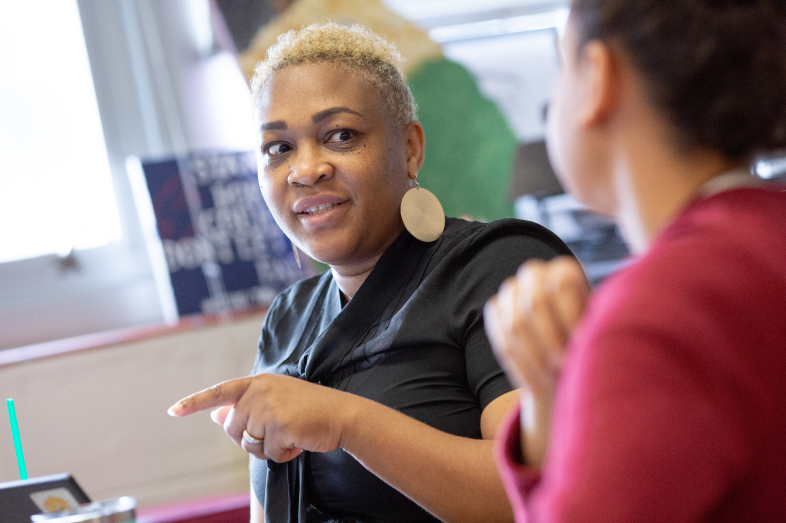Teresa Hill quit her job as a principal in Arizona after a standoff with parents over COVID-safety protocols went viral — and threats poured in from as far as Canada.
Mark Anderson, a school leader in California, scrambled to diffuse outrage over a video featuring baseball team members using racial slurs amid the reckoning after George Floyd’s murder in 2020. Later, he faced pushback to a new ethnic studies curriculum.
And in 2021, Ryan Judge stepped down from his principalship in New York after he says a district leader told him he didn’t want “an overweight gay man” as the face of the campus.
These school leaders’ experiences capture the realities of a profession that has thrust principals onto the frontlines of the country’s most politically charged debates — from COVID-safety protocols to the handling of race, gender and bias in the classroom.
The growing politicization of public education has tested school leaders like never before, the three principals said during a session at the Education Writers Association’s 2023 National Seminar. The panel was moderated by Sarah Mervosh, a national reporter covering education for The New York Times.
These unprecedented pressures have strained principals’ morale and led some to leave the profession, even as research has shown that school leader turnover is extremely disruptive to school communities. The panelists discussed how they navigated today’s challenging climate — and how journalists can cover these issues more thoughtfully and effectively.
Principals: ‘Bearing the Brunt of Political Polarization’
A 2022 survey of 1,540 principals and 2,360 educators by the nonprofit research organization, RAND Corporation, showed that political divisions loom large in the day-to-day work of school leaders and their staff.
Almost half of the principals surveyed said that the intrusion of politics into their work has become a job-related stressor, and more than 60% reported experiencing harassment on the job, most commonly from parents, especially in more affluent majority white schools.
“Principals as the public faces of their schools are bearing the brunt of political polarization,” said Ashley Woo of RAND. She’s a former teacher who presented the findings during the panel.
School leaders cite that politicization as a main reason for thinking about leaving their jobs. A key takeaway is that principals need more support navigating political pressures, from more guidance on that aspect of the job in principal preparation programs to more time to troubleshoot with other school leaders, Woo said.
Why Principals Say They Quit Their Jobs
Judge agreed more support for school leaders is key. He left his job as a principal in upstate New York and returned to the assistant principalship at Rondout Valley High School, where he says school safety and threat assessment have come to dominate his workload.
“The principal has a target on the back because their role is to always take the blow, so it doesn’t reach the teachers, and take the blow, so it doesn’t impact the superintendent,” he said. “That was exhausting.”
A lack of support from her school district was central in a decision Hill – a former Tucson-area principal who now works at the Arizona Educational Foundation – didn’t think she would ever make after three decades as an educator: leaving her principal post in the middle of the school year. Hill was named National Association of Secondary School Principals’ 2021 Arizona Principal of the Year, and her experiences were chronicled by “This American Life.”
At the height of the pandemic, she found herself caught between families pushing for strict COVID-safety protocols — and others who felt such protocols infringed on their rights. A group of parents, including a state senator, camped out at Hill’s office for hours, refusing to leave until she allowed a quarantined student back into the classroom. Police eventually escorted the group out of the school building, but a video of the encounter that a parent had recorded went viral online.
Hill received dozens of emails and voicemail messages disparaging and threatening her.
“I felt very isolated,” she said. “I didn’t have any support. The district didn’t say anything.”
Navigating Heated Debates as a Principal
Anderson – another principal who got swept up in a pandemic-era controversy at his former school in Pasadena, California – said he was able to navigate it successfully. And he rethought his position on taking a public stance on political issues along the way.
In summer 2020, following the murder of George Floyd by Minneapolis police, a video emerged of two members of the Pasadena school’s baseball team using the N-word. Anderson faced intense pressure to punish the students and perhaps the entire team as a result.
“As a principal, you don’t take sides in politics,” he said. “Schools should be a laboratory for different views. Now, everyone was asking me to take a side.”
He decided to take a strong position in condemning the language in the video, and he marched with some 300 students in a Black Lives Matter rally that started at the front steps of his school building.
In an email to the school community, he celebrated the student organizers of the march. But he also said he would work to educate the baseball players about why their exchange was offensive rather than banishing them from the team or the school.
“I was able to really calm down the community at the time,” he said.
Anderson, who now oversees high school principals in Hacienda La Puente Unified School District in California, said he was also able, more recently, to diffuse blowback to a plan to introduce ethnic studies in all grades by having conversations with concerned parents.
Reporting on Principals and Students
The presenters urged reporters to put more time and effort into highlighting experiences, such as Anderson’s, in which dialogue and engagement with families helped resolve tense situations.
When a new curriculum or class is at the center of a controversy, journalists can serve the public by clearly explaining exactly what will be taught and how educators will ensure that the content is age-appropriate.
After all, as Woo pointed out, research has shown that a majority of American parents support the teaching of controversial topics in school — as long as it is age-appropriate.
The speakers also encouraged reporters to do more to center students in their coverage of political pressures on schools and their leaders. Judge said that it’s often students leading the way on changes that can spark controversy, such as the push for a gender-inclusive homecoming and prom in his district. But media coverage can lose sight of that key role youth play — and, the speakers said, the resulting reports can come out more shrill and less nuanced as a result.
“Kids respect each other,” Hill said. “Kids are open to having discussions. The challenge is always outside of the school.”
Anderson suggested inviting a student to pen a first-person account rather than merely including a soundbite from that student in a story.
The panelists also encouraged reporters to probe how the politicization of education is affecting day-to-day classroom instruction, including high-stakes efforts to address the profound academic damage from the pandemic.
Is the intense scrutiny of how educators deal with issues of race and gender leading to more watered-down curricula? Is the pressure of complying with new, sometimes vague, state laws limiting what educators can teach causing some to leave the profession — in a post-pandemic era when students need stability more than ever before?
“Really good teachers have chosen to leave the classroom because of the fear tactics, because of the lack of respect,” Hill said.





